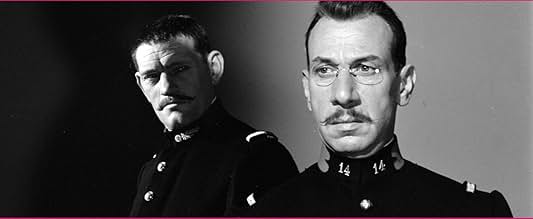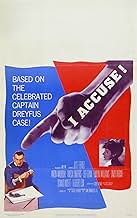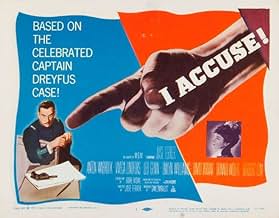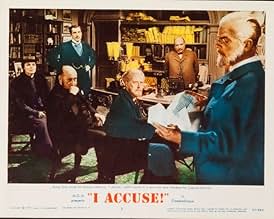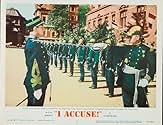En la Francia de 1894, un oficial judío del ejército francés es acusado falsamente de espiar para Alemania.En la Francia de 1894, un oficial judío del ejército francés es acusado falsamente de espiar para Alemania.En la Francia de 1894, un oficial judío del ejército francés es acusado falsamente de espiar para Alemania.
- Dirección
- Guionistas
- Elenco
José Ferrer
- Captain Dreyfus
- (as Jose Ferrer)
- Dirección
- Guionistas
- Todo el elenco y el equipo
- Producción, taquilla y más en IMDbPro
Opiniones destacadas
10dobbs-12
This is a true story of the Alfred Dreyfus indictment and imprisonment of an innocent man who loved his country. Dreyfus was a Jew in the French army and that is probably the main reason he was persecuted and found guilty of treason. The man was innocent but sent to Devil's Island anyway. He finally was released and his honor restored. His living relative (actor Richard Dreyfus) made a film of this tragedy and it is without a doubt one of the best films I've watched lately. Be sure to watch them both because this is history.
Great story for then and now about politics and false accusation. Acting was great. Movies from 30's 40's and some 50's are of great quality. Well written and filmed. You will enjoy. Reminds me of Les Misérables. But seems more real like in the story.
Jose Ferrer acted in more than 100 movies and TV episodes. One of his sons, Miguel Ferrer, and a nephew, George Clooney, followed successfully his steps in the movie business. All this was not an accident. Jose Ferrer's Oscar winning performance in Cyrano De Bergerac in 1950 was followed 8 years later in I Accuse! Although not winning another Oscar, his portrayal of a French Jewish artillery captain, Alfred Dreyfus, falsely accused of treason in 1894, sentenced and sent to Devil's Island, makes one feel what the relative of actor Richard Dreyfus felt while publicly being degraded, his sword broken and what he had to live in the tropical God forgotten Atlantic island, 7 miles off the coast of French Guiana, where he was sent at the beginning of 1895. Many people stood for him, like French writer Emile Zola and one can check it in Paul Muni's The Life of Emile Zola, but there is NO DVD RELEASE OF "I ACCUSE"! So I Accuse the studio MGM or whoever has the rights now days, of negligence in not releasing this movie on DVD. I can write down a thousand titles list of crap movies released by MGM, worthless garbage, in the past 20 or so years, but they had to miss this one. Shame on whoever is in charge of selecting which movies to be released on DVD and which not. Who died and made him God in that department? Wake up MGM and deal with this. I bet anything that I'm not the only one that wants that movie released on DVD.
A film based on the infamous Dreyfus Affair wherein a French soldier is convicted & imprisoned for a crime he did not commit & eventually due to the protestations of the populace & the well known writer Emile Zola, he was eventually acquitted. Directed by & starring Jose Ferrer, this heart in its right place account of the trials & tribulations of this railroaded individual comes off as a rather important history lesson then an affecting drama. There was a version done on HBO in the 90's called Prisoner of Honor (directed by Ken Russell) which tackled the same subject matter & I remember the result was about the same. It may be a case of the trial being more of a cause celebre outside this country which may leave American viewers a bit on the periphery where we agree the stakes are obvious & noble but w/o a frame of reference ultimately we kind of shrug it off. Perhaps a French version (much like Cyrano de Bergerac w/Gerard Depardieu for me is the consummate version of the tale while the 50's version also w/Ferrer which he won the Oscar for is pretty good but not as good as its foreign language descendant) will do the trick.
The issues raised by the terrible injustice inflicted upon Captain Alfred Dreyfus and Emile Zola's subsequent rallying cry 'J'accuse' in 'L'Aurore' of 1898 are timeless and have certainly struck a chord with film-makers, enabling many of them to draw parallels with their own times and experiences.
The final speech by Paul Muni as Zola in William Dieterle's excellent biopic is a veiled reference to the rise of Nazism although strangely, considering that Dreyfus was Jewish, no one utters the words 'Jew' or 'anti-Semitic'. Fast forward eighty odd years and we have a version by Roman Polanski for whom the Jewish element would have provided many painful memories. There are those who have seen in his film an allegory of the director's own perceived persecution by LA County! Yves Boisset's TV film reflects his cinematic crusade to depict institutionalised corruption whilst the Ken Russell/Richard Dreyfus version is just one too many. Mr. Dreyfus is advertising his liberal credentials here and claims to be a descendant of the unfortunate Captain. The fascination of the eleven minute series by Georges Melies stems from its being made whilst the Dreyfus affair was still raging. I have alas never seen Richard Oswald's version and would be interested to see how the Germans handled the subject.
This adaptation from 1958 is directed by and stars well-known liberal José Ferrer, is produced by Sam Zimbalist and has a screenplay by Gore Vidal. Hardly surprising therefore that there are distinct echoes here of the McCarthy witch hunts.
It is made in a very matter-of-fact manner and some of the leading characters are under-written but the emotive material and strong performances carry us through.
A contingent of dependable British thespians is on dispay here notably Leo Genn whose genteel persona suits perfectly the character of Major Picquart who campaigned tirelessly for Dreyfus' acquittal whilst the odious General Mercier of Donald Wolfit epitomises Oscar Wilde's observation that "patriotism is the virtue of the vicious." Equally obnoxious is Major du Paty played by the superlative Herbert Lom, sans peruke. The two performances that linger longest are those of Swedish born Viveca Lindfors who brings her customary intelligence and sensitivity to the role of Madame Dreyfus and the immaculate Austrian Anton Walbrook who effortlessly steals all of his scenes as the charming but despicable Major Esterhazy.
José Ferrer achieves the Herculean task of being both director and portraying Dreyfus. A previous reviewer, female naturally, has remarked upon Mr. Ferrer's lack of charisma and sex appeal. I was not aware that Dreyfus possessed either of those attributes or that Mr. Ferrer was ever called upon to play a role that required them. He is immensely sympathetic in the part and what he does possess is that golden voice.
The film proudly announces that Dreyfus' eventual acquittal and reinstatement represent a brave chapter in French history. This is of course absolute tosh for were it not for the bravery and determination of a few individuals, Dreyfus would have been left to rot on Devil's Island.
The final speech by Paul Muni as Zola in William Dieterle's excellent biopic is a veiled reference to the rise of Nazism although strangely, considering that Dreyfus was Jewish, no one utters the words 'Jew' or 'anti-Semitic'. Fast forward eighty odd years and we have a version by Roman Polanski for whom the Jewish element would have provided many painful memories. There are those who have seen in his film an allegory of the director's own perceived persecution by LA County! Yves Boisset's TV film reflects his cinematic crusade to depict institutionalised corruption whilst the Ken Russell/Richard Dreyfus version is just one too many. Mr. Dreyfus is advertising his liberal credentials here and claims to be a descendant of the unfortunate Captain. The fascination of the eleven minute series by Georges Melies stems from its being made whilst the Dreyfus affair was still raging. I have alas never seen Richard Oswald's version and would be interested to see how the Germans handled the subject.
This adaptation from 1958 is directed by and stars well-known liberal José Ferrer, is produced by Sam Zimbalist and has a screenplay by Gore Vidal. Hardly surprising therefore that there are distinct echoes here of the McCarthy witch hunts.
It is made in a very matter-of-fact manner and some of the leading characters are under-written but the emotive material and strong performances carry us through.
A contingent of dependable British thespians is on dispay here notably Leo Genn whose genteel persona suits perfectly the character of Major Picquart who campaigned tirelessly for Dreyfus' acquittal whilst the odious General Mercier of Donald Wolfit epitomises Oscar Wilde's observation that "patriotism is the virtue of the vicious." Equally obnoxious is Major du Paty played by the superlative Herbert Lom, sans peruke. The two performances that linger longest are those of Swedish born Viveca Lindfors who brings her customary intelligence and sensitivity to the role of Madame Dreyfus and the immaculate Austrian Anton Walbrook who effortlessly steals all of his scenes as the charming but despicable Major Esterhazy.
José Ferrer achieves the Herculean task of being both director and portraying Dreyfus. A previous reviewer, female naturally, has remarked upon Mr. Ferrer's lack of charisma and sex appeal. I was not aware that Dreyfus possessed either of those attributes or that Mr. Ferrer was ever called upon to play a role that required them. He is immensely sympathetic in the part and what he does possess is that golden voice.
The film proudly announces that Dreyfus' eventual acquittal and reinstatement represent a brave chapter in French history. This is of course absolute tosh for were it not for the bravery and determination of a few individuals, Dreyfus would have been left to rot on Devil's Island.
¿Sabías que…?
- TriviaThis movie was not shot in widescreen. It was converted to CinemaScope in the final print after having been shot in standard Academy ratio, much like some movies, which are "matted" after having been shot in Academy ratio. The process used was contemporary of SuperScope and a forerunner of Super 35. It was filmed using spherical lenses at an aspect ratio of 1.37:1. In the printing process, the images were cropped to a height of two perforations, giving them an aspect ratio of 2.36:1. The images were then stretched vertically to a height of four perforations, at which point they conformed to the standard CinemaScope-2 format.
- Citas
Émile Zola: This Esterhazy is one of the most glorious liars that ever drew breath. Why, the authority of it, the poise; the man's a genius!
- Créditos curiosos[Scrolling Prologue] In 1894 Alfred Dreyfus, a French Army officer, stood before a military tribunal accused of treason. The outcome of this trial, a trial that created an international sensation, is a brave chapter in the history of France, that nation which first proclaimed the Rights of Man.
Selecciones populares
Inicia sesión para calificar y agrega a la lista de videos para obtener recomendaciones personalizadas
- How long is I Accuse!?Con tecnología de Alexa
Detalles
Taquilla
- Presupuesto
- USD 1,800,000 (estimado)
- Tiempo de ejecución
- 1h 39min(99 min)
- Color
- Mezcla de sonido
- Relación de aspecto
- 2.35 : 1
Contribuir a esta página
Sugiere una edición o agrega el contenido que falta

